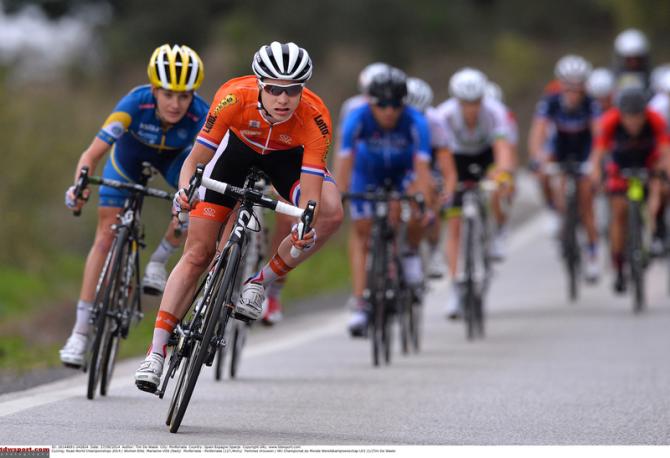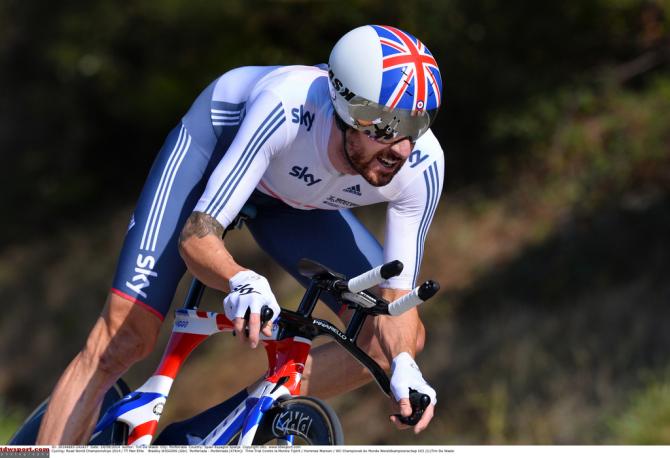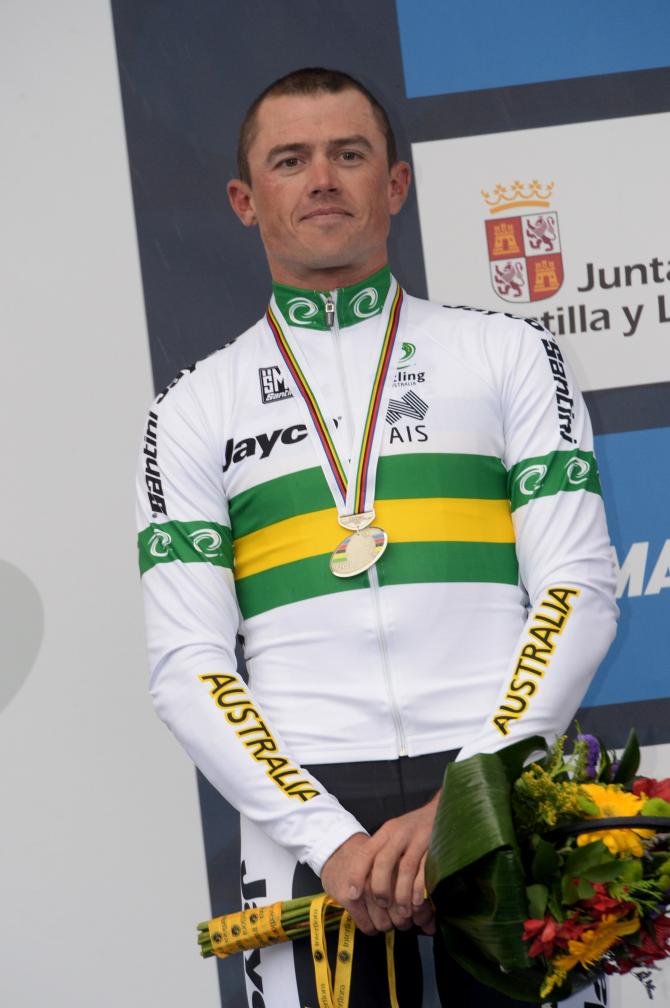Top 10 conclusions from the road world championships
Part 1: Wiggins, Vos, Italy and Gerrans



Wiggins carries Great Britain
Whether you’re a fan of Bradley Wiggins or not, few can argue over the rider’s impressive, almost extraordinary, palmares. A Tour de France; a handful of week-long stage races; world titles and Olympic medals on the road and track: all he needs now is a win in the Classics to complete his set.
To broaden the point, he’s not only Great Britain’s most successful cyclist of all time; he’s also one of the most complete athletes the sport has ever produced.
Yet physical attributes aside, it’s Wiggins’ ability to flip between disciplines and targets that’s most impressive. Much of this stems from Sky’s willingness – and at times it seems they don’t have much choice – or allowance in letting the rider pick and chose his objectives, but in a matter of weeks, Wiggins morphed from track rider at the Commonwealth Games, to week-long stage rider at the Tour of Britain, to time trial world champion at Ponferrada, Spain. He may have missed out on the first two targets but he scored the most important and arguably most difficult, just at the right time.
He may never win another Grand Tour and to some it may feel like he has been a passenger at Team Sky – he’s barely raced a WorldTour event in the last two seasons - but he has already achieved a status most riders never accomplish: he’s an icon. And Ponferrada didn’t cement this; it merely reinforced it.
And that point was given greater definition by Great Britain’s overall performance at the Worlds where Wiggins picked up the team’s only medal. Lizzie Armistead provided a valiant performance in the women’s race but was ultimately frustrated into submission, while in the men’s event the team could only manage 12th through Ben Swift. The nine-man team entered the race with the correct approach and by backing Kennaugh and Swift they deserve more praise than the Dutch and several other nations who either failed to make an impact or got their tactics wrong but in the remaining races the team’s highest performance came from Melissa Lowther in the junior women’s time trial (seventh).
It would be wrong to say that Wiggins’s win papered over the cracks but his TT triumph certainly emphasized his importance to Team Sky and British Cycling. With all these factors combined, it’s little wonder that a development team with him at the centre is in the offing. (DB)
The latest race content, interviews, features, reviews and expert buying guides, direct to your inbox!
Italy full of heart but tactics cost them
The Italian Squadra team left Ponferrada without a medal but with their heads held high, proud that they at least tried to take control of the race with a series of attacks in the final laps.
Sonny Colbrelli was Italy's best placed rider, finishing 13th after he managed to stay with the sprinters on the final climb of Mirador and finish with the likes of John Degenkolb, Nacer Bouhanni, Fabian Cancellara and Michael Matthews. Italian national coach Davide Cassani praised the young Bardiani-CSF rider and also refused to criticise any of his riders after they gave their all.
After 20 years an Italian television pundit, Cassani is skilled at deflecting criticism and the Italian media seem ready to accept that 2014 is year one (or even year zero) of a long-term project to rebuild the Italian national squad at every level.
Italy lacked a true team leader and finisher like Gerrans or Degenkolb and so winning the rainbow jersey was always unlikely in Ponferrada. The riders followed Cassani's "Controlled Chaos" strategy, collectively going on the attack with 70km still to race and then always having a rider in the moves. However there is little else the Italian team got right. There was little control and lots of chaos, with the lack of race radio blamed for them riding like a team of juniors.
Giovanni Visconti was supposed to be a protected team leader for the final two laps but he kept going in the break with Tony Martin and Pete Kennaugh, using up his energy in a move that was never going to be decisive. Alessandro De Marchi tried his hand late on but used all his energy to keep the attack alive and so had little left in his legs to go with Kwiatkowski when he jumped across. Vincenzo Nibali rode better than expected, especially after his mid-race crash, but was never going to have the legs to go with a late attack and then win alone as he did in Sheffield at the Tour de France. Colbrelli tried his best but made a mess of the sprint for seventh place.
In short, Italy tried hard, went on the attack and gave it a go but messed up tactically, ending their already slim chances of success.(SF)
One last hope for Gerrans
Simon Gerrans came into the Worlds as a red hot favourite having won back-to-back one-day races in Canada. On the evening of his second win in Montreal, one journalist at the event rather prophetically exclaimed that the Australian's second win would guarantee his failure in Ponferrada.
In the end, it wasn’t a question of a loss of form, or being marked out of the race, as many expected. Quite simply, Gerrans was beaten by a better rider on the day. Such is the line between victory and failure, that each time Kwiatkowski’s winning move is replayed it seems inevitable that he will be caught – just before he attacks the group including De Marchi, he’s within touching distance and the chase behind can almost feel the spray from his rear wheel as rides away from them in the rain.
Gerrans would eventually settle for silver, bringing and end to his recent hot streak and the immediate conclusion is that he has missed his final chance of donning the rainbow jersey.
For a rider who has a skill in remaining invisible right until the last moment, Ponferrada was a course tailored to his skill set. Next year in Richmond, with the course holding less than 1000ft in climbing, we should see the riders who competed for eighth in Spain – Kristoff, Bouhanni and Matthews compete for the win – with the following year a nailed-on bunch sprint in Qatar. To win next year, Gerrans will have to change his tactics – something he’s more than capable of doing but the Rio Olympic course may turn out to be a more likely target for his aspirations. (DB)
Is Vos’ dominance under threat?
Since winning the road title for the first time in 2006, Marianne Vos had never finished lower than second in the road race. No matter what the course, she would make it onto the podium. Ponferrada marks the first time in her professional career that Vos leaves the road World Championships without a medal.
There are a number of factors in this. Vos saw a medal-winning chance go up in smoke during the team time trial, after a crash took out almost the entire team. It was just a minor setback, but one she could have done without. The important event was still ahead, the road race.
It looked like things were going to plan in the road race when she escaped off the front with three others. However, Vos looked unusually cautious in this group of favourites, as they inexplicably sat up and allowed the chasers to close them down. For a rider who we are used to seeing take races by the scruff of the neck, it was a strange sight.
Vos has beaten all three of her escape companions in sprints in the past, and would have been the favourite to take victory from this select group, but they refused to work together. As the race approached the finish line, she did take up the sprint from the front but was swamped when the others followed suit. In stead it was her trade teammate Pauline Ferrand-Prévot that took the honours.
The Dutch rider rolled across the line in 10th and the disappointment was evident on her face. Prévot’s victory has shown that Vos is not the unbeatable rider she once was. This year’s world championships saw a large group of riders arriving in very good form and rarely have we seen so many potential contenders.
Vos will look at this race as a small blip on yet another superlative season and you can bet your house that she will be as good as ever in 2015. It won’t be as easy for her to win as it was in the past and her rivals have certainly closed the gap on the Queen of cycling. The depth of talent is as good as it ever has been in women’s cycling and, with teams getting ever more focussed and structures, this will only increase. (SO)
A tougher circuit would produce a better race
Depending on who you listened to before the world championships, the Ponferrada circuit suited the sprinters, the Ardennes Classics riders and even the Grand Tour contenders. It reportedly had more metes of climbing than last year's race on Florence, with no flat transfer section to the circuit and two climbs positioned closely together on each of the fourteen, 18.2km laps. There were lots of favourites but few punters had any real clue on who would win the world title.
When teams arrived in Ponferrada, many seemed to accept the elite men's race would end in a sprint as the course seemed flatter and easier than many expected, with the first Confederacion climb little more than a long drag out of town and the second Mirador climb just a short, sharp drag up the a hillside was finely balanced but not very inspiring, offering little chance for attacks to get away before the finish. But then the junior and under 23 races showed that breakaways had a chance. The rain also convinced some teams that the race would be more selective.
Yet on the day in both the elite women's and elite men's events, produced a controlled and hesitant race, stifling any decisive attacks and turning both races into a kind of end of season Milan-San Remo. The final 10 minutes were thrilling but the six hours before that were sleep inducing.
The UCI reportedly ensures that every 10 years a world championship course suits the sprinters. Perhaps they should ensure that the courses approved for the other nine years include sufficient climbing to inspire serious attacks and more aggressive racing. (SF)
